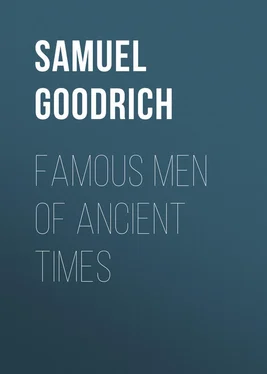Samuel Goodrich - Famous Men of Ancient Times
Здесь есть возможность читать онлайн «Samuel Goodrich - Famous Men of Ancient Times» — ознакомительный отрывок электронной книги совершенно бесплатно, а после прочтения отрывка купить полную версию. В некоторых случаях можно слушать аудио, скачать через торрент в формате fb2 и присутствует краткое содержание. Жанр: foreign_prose, на английском языке. Описание произведения, (предисловие) а так же отзывы посетителей доступны на портале библиотеки ЛибКат.
- Название:Famous Men of Ancient Times
- Автор:
- Жанр:
- Год:неизвестен
- ISBN:нет данных
- Рейтинг книги:5 / 5. Голосов: 1
-
Избранное:Добавить в избранное
- Отзывы:
-
Ваша оценка:
- 100
- 1
- 2
- 3
- 4
- 5
Famous Men of Ancient Times: краткое содержание, описание и аннотация
Предлагаем к чтению аннотацию, описание, краткое содержание или предисловие (зависит от того, что написал сам автор книги «Famous Men of Ancient Times»). Если вы не нашли необходимую информацию о книге — напишите в комментариях, мы постараемся отыскать её.
Famous Men of Ancient Times — читать онлайн ознакомительный отрывок
Ниже представлен текст книги, разбитый по страницам. Система сохранения места последней прочитанной страницы, позволяет с удобством читать онлайн бесплатно книгу «Famous Men of Ancient Times», без необходимости каждый раз заново искать на чём Вы остановились. Поставьте закладку, и сможете в любой момент перейти на страницу, на которой закончили чтение.
Интервал:
Закладка:
The Koran or Alkoran, meaning the Book , is a collection of all the various fragments which the prophet uttered during the period in which he professed to exercise the apostolic office. They were originally written on scattered leaves, but they were collected by Abubeker, two years after Mohammed's death. They are in the purest and most refined dialect of Arabia, and are distinguished by extraordinary graces of style.
The Koran furnishes not only the divinity, but the civil law of the Mohammedans. It professes to contain the revelation of God's will by Gabriel to Mohammed, and through him to mankind. One of the books gives an account of the translation of the prophet by night to the third heaven, upon a winged animal, named Alborak, and resembling an ass, where he saw unutterable things. The great doctrines of the Koran, as before stated, are the existence of one supreme God, to whom alone adoration and obedience are due. It declares that the divine law was faithfully delivered by Adam, Noah, Abraham, Moses, and Christ. It declares the immortality of the soul of man, and the final judgment, and sets forth that the good are to dwell in everlasting bliss, amid shady and delicious groves, and attended by heavenly virgins. The hope of salvation is not confined to the Moslem, but is extended to all who believe in God and do good works. Sinners, particularly unbelievers, are to be driven about in a dark burning hell, forever.
The practical duties enjoined by the Koran, are the propagation of Islamism, and prayers directed to the temple of Mecca, at five different periods of the day, together with fasting, alms, religious ablutions, pilgrimages to Mecca, &c. It allows a man but four wives, though the prophet had seventeen, and it is curious to add that all were widows, save one. It strongly prohibits usury, gaming, wine and pork.
We cannot deny to Mohammed the possession of extraordinary genius. He was a man of great eloquence, and the master of a beautiful style of composition; and he possessed that majesty of person, which, united to his mental qualities, gave him great ascendancy over those who came into his presence. He lived in a dark age, amid a benighted people; yet, without the aids of education, he mastered the religious systems of the day, and took a broad and sagacious view of the moral and political condition of the people of Asia. He conceived the sublime idea of uniting, by one mighty truth, the broken fragments of his own nation, and the destruction of idolatry by the substitution of the worship of one God. It is true, that he sought to accomplish these ends by unlawful means – by imposture, and the bloody use of the sword; we must admit, also, that he was licentious and although we cannot fail to condemn his character, we must acknowledge the splendor of his abilities and allow that while he imposed on his followers, he established a faith infinitely above Paganism, and sprinkled with many rays of light from the fountain of Divine Truth.
BELISARIUS
This celebrated general, to whom the emperor Justinian is chiefly indebted for the glory of his reign, was a native of Germania, on the confines of Thrace, and was born about the year 505. It is probable that he was of noble descent, liberally educated, and a professor of the Christian faith. The first step in his military career was an appointment in the personal guard of Justinian, while that prince was yet heir apparent to the throne.
The Roman or Byzantine empire, at this period, embraced almost exactly the present territory of the Turkish dominions in Europe and Asia Minor, with the addition of Greece – Constantinople being its capital. Italy was held by the Goths; Corsica, Sardinia and Barbary in Africa, by the Vandals.
Justin I., an Illyrian peasant, having distinguished himself as a soldier, had become emperor. His education was of course neglected, and such was his ignorance, that his signature could only be obtained by means of a wooden case, which directed his pen through the four first letters of his name. From his accession, the chief administration of affairs devolved on Justinian, his nephew and intended heir, whom he was reluctantly compelled to raise from office to office, and at length to acknowledge as his partner on the throne. His death, after a languid reign of nine years and a life of nearly fourscore, left Justinian sole sovereign in name, as well as in fact.
In order to appreciate the life and actions of Belisarius, it is necessary to understand the character of the new emperor, during whose long reign his great exploits were performed. The first act of Justinian on ascending the throne, was to marry a dissolute actress, named Theodora, who, though licentious, avaricious, cruel and vindictive, soon acquired an almost complete control over him. His mind was essentially feeble and inconstant, and, though his Christian faith was doubtless sincere, it was less fruitful of virtues than of rites and forms. At his accession his treasury was full; but it was soon exhausted by his profuseness, and heavy taxes were imposed, offices put to sale, charities suppressed, private fortunes seized, and, in short, every act of rapacity, injustice and oppression, practised by his ministers, to support the wasteful magnificence of the court.
The troops of the empire at this period were by no means what they had been in the time of Scipio and Cæsar. They consisted, to a great extent, of foreign mercenaries, and were divided into squadrons according to their country; thus destroying all unity of feeling, and annihilating that national spirit which once made the Roman arms the terror of the world. These hired troops, which greatly outnumbered the native soldiers, marched under their own national banner, were commanded by their own officers, and usually followed their own military regulations. The inefficiency of such mingled and discordant forces, is obvious; yet it was under such a system that Belisarius entered upon his military career.
With a feeble and corrupt government, an ill-appointed and trustless army, the Roman empire was still surrounded with powerful enemies. It is scarcely possible to conceive of a great nation in a condition of more complete debility and helplessness, than was the kingdom of the Cæsars, at the period in which Belisarius appears upon the active stage of life.
Kobad, king of Persia, after a long cessation of hostilities, renewed the war toward the close of Justin's reign, by the invasion of Iberia, which claimed the protection of the emperor. At this period, Belisarius, being about twenty years of age, had the command of a squadron of horse, and was engaged in some of the conflicts with the Persian forces, on the borders of Armenia. In conjunction with an officer named Sittas, he ravaged a large extent of territory, and brought back a considerable number of prisoners.
On a second incursion, however, they were less fortunate; for, being suddenly attacked by the Persian forces, they were entirely defeated. It appears that Belisarius incurred no blame, for he was soon after promoted to the post of governor of Dara, and the command of the forces stationed there. It was at this place that he chose Procopius, the historian, as his secretary, and who afterwards repaid his kindness by a vain attempt to brand his name with enduring infamy.
Soon after Belisarius obtained the command of Dara, Justinian came to the throne, and enjoined it upon his generals to strengthen the defences of the empire in that quarter. This was attempted, but the Persians baffled the effort. Belisarius was now appointed general of the East, being commander-in-chief of the whole line of the Asiatic frontier. Foreseeing that a formidable struggle was soon to ensue, he applied himself to the raising and disciplining an army. He traversed the neighboring provinces in person, and at last succeeded in mustering five and twenty thousand men. These, however, were without discipline, and their spirit was depressed by the ill success that had long attended the Roman arms.
Читать дальшеИнтервал:
Закладка:
Похожие книги на «Famous Men of Ancient Times»
Представляем Вашему вниманию похожие книги на «Famous Men of Ancient Times» списком для выбора. Мы отобрали схожую по названию и смыслу литературу в надежде предоставить читателям больше вариантов отыскать новые, интересные, ещё непрочитанные произведения.
Обсуждение, отзывы о книге «Famous Men of Ancient Times» и просто собственные мнения читателей. Оставьте ваши комментарии, напишите, что Вы думаете о произведении, его смысле или главных героях. Укажите что конкретно понравилось, а что нет, и почему Вы так считаете.












